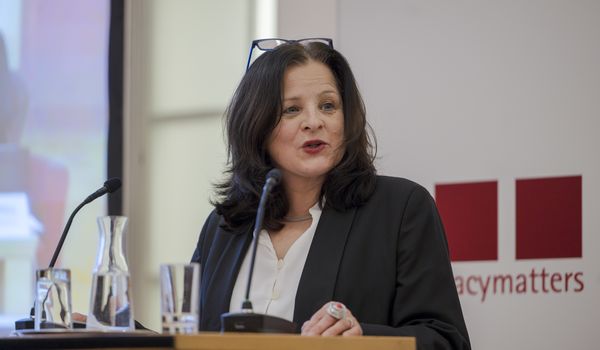The VIDC event "Climate Solutions in Times of Crises — Tools, Trade-offs, and Global Responsibilities" took place on 26 November 2024, at the Diplomatic Academy of Vienna. It was followed by the webinar "A Climate of Equality?", taking place on 27 November (see box).
The panel discussion explored various governmental instruments—taxation, regulation, subsidies, and incentives—and their effectiveness in combating climate change while promoting just and sustainable practices. A key focus was the role of taxation in funding adaptation and mitigation efforts, in relation to the new VIDC paper, A Climate of Equality: Protecting the Environment and Safeguarding Justice in a Progressive Tax System, co-authored by Jacqueline Cottrell and Tatiana Falcão. The event was moderated by Sigrid Stagl (Director, Institute for Ecological Economics, WU Vienna).
"We need to think about policies (…) that are well-designed for the particular area they are targeting"

After welcoming remarks by Martina Neuwirth (VIDC Global Dialogue), Moritz Schwarz (Climate Economist, TU Berlin, Potsdam Institute for Climate Impact Research, University of Oxford) pointed at an "evaluation gap" in global climate policies. He noted that while governments worldwide have increasingly implemented climate policies, most evaluations are conducted only before and not after implementatio. Furthermore, academic studies tend to focus on a narrow set of policies, such as carbon pricing, without considering the complexity of policy mixes, which are more common in real-world governance.
Mr. Schwarz explained how he and his co-authors addressed this gap in their new study, which draws on a unique OECD database covering 1,500 policies implemented over 30 years in more than 50 countries. The study assessed which policies had the most significant impact on reducing carbon emissions. The findings revealed that only 65 to 70 of these policies resulted in substantial emission reductions, collectively cutting approximately 1.8 billion tonnes of carbon, i.e. an average reduction of 19%. These successes were observed across 41 countries, including 15 developing nations, although data limitations constrained further analysis in the Global South. A widespread replication of these successful policies could close the 2030 emissions gap by 40%.
Mr. Schwarz highlighted three critical insights from the study. First, “(w)e've really seen that policies are more successful if they don't try to do everything through one policy but try to design well-designed policy mixes that really tackle a number of different actors and a number of different sectors at the same time. (…) (W)e need to think about a change in the way that we evaluate them, but also in the way that we design them going forward”, he said.
Second, no single policy model can fit all contexts. “We haven't found a single country that had successful policies in all sectors that we looked at and we looked at in the industrial sector, the power sector, the transport sector and the building sector.” The study results also underscore that developing and developed countries often need different types of policies. Especially countries or industries that are mature and experience a lower growth rate can rely more on carbon pricing and on price instruments, while in high-growth countries and sectors policies that limit emissions and improve technology or efficiency standards are key.
Third, the size of the sector in question matters for effective climate policy design – the more actors, the more differential policy instruments are needed. For instance, power and industrial sectors, with fewer stakeholders, are more responsive to emission trading schemes, while mobility and building sectors require more nuanced interventions due to the large number of participants.
Finally, Mr. Schwarz stressed that „in instances where the questions of equity or the questions of social compensation are not part of a policy mix, (…) the ambition of that policy mix is lacking”. More social-oriented and comprehensive policies are also more ambitious in their climate goals.
“Social aspects should be front and centre of environmental policies"

Jacqueline Cottrell (green fiscal policy consultant, Green Budget Germany) focused on the findings of the VIDC study “A Climate of Equality: Protecting the Environment and Safeguarding Justice in a Progressive Tax System”, co-authored with Tatiana Falcão. The study explored how to reconcile environmental taxation with principles of equity, fairness, and progressivity.
Mrs. Cottrell emphasized that carbon taxes, though essential for reducing emissions, are often regressive as they disproportionately affect low-income groups – “(carbon taxes) are not designed bearing in mind the ability of the taxpayer to pay, they're designed to tax a particular environmental tax base.” And, if these taxes are introduced at very low rates, they are ineffective in achieving real behavioural change or emissions reductions, hence not fulfilling the purpose of an environmental tax.
“What our paper tried to do is bring some clarity to this discussion and really make clear that we have to understand the way that we implement carbon and environmental taxes,” said Mrs. Cottrell. She noted that the wealthiest 10% of the population are responsible for nearly half of global carbon emissions and stressed that the failure to implement a carbon tax can be equated with a failure to address the inequality of contributions to pollution. This reinforces the case for the "polluter pays" principle, where those contributing the most to pollution should also mostly bear the financial burden.
In their paper, Jacqueline Cottrell and Tatiana Falcão acknowledge the regressive nature of environmental taxes and propose the adoption of comprehensive social compensation mechanisms. Mrs. Cottrell described that it is crucial to understand inequality across its multiple dimensions such as gender, income, or urban vs rural population, when designing tools to obtain progressivity. She importantly noted that a tax levied per unit of carbon emitted can be understood as a type of wealth tax – those who consume more carbon-intensive products will automatically pay more carbon tax. Such a tax is therefore capable of directly tackling energy over-consumption by wealthy individuals in a much more proportionate manner than a direct tax on profits would.
Cottrell and Falcão propose an “eco-social welfare state” approach – a system in which the government prioritizes both environmental protection and the well-being of all citizens.
The paper also explores a number of different strategies that governments can implement. For example, in low- and middle-income countries which often lack advanced data systems like those in the EU, policymakers could use community-based systems or existing policy instruments to identify vulnerable households and introduce welfare measures.
“There’s no ‘one-size-fits-all’”

Roshelle Ramfol (professor at the University of South Africa) noted that a problem often seen in Global South countries is a drive to adopt Global North nations' policies, rather than tailoring them to local circumstances. Resulting tensions are also visible in South Africa: On one hand it has to transform its energy system to achieve the climate targets it has committed itself to, as requested by the Paris Agreement. On the other hand, it struggles to ensure that there is affordable energy access for all. South Africa's energy system, currently 80% coal-reliant, faces significant challenges. “The country has been plagued with energy shortages (…). And that has affected the economy and the country as a whole,” Mrs. Ramfol said.
South Africa has been the first African country to adopt a carbon tax. South Africa experiences high levels of inequality, which could be exacerbated by the carbon tax. But carbon tax revenues could provide support for social programs to offset regressive effects on low-income households and for a transition to cleaner technologies. Greater transparency about the use of those revenues is necessary.
According to Mrs. Ramfol, apart from the carbon tax “the government has to find ways to incentivize renewable energy technology (…) (to) secure a greater share of renewable energy access”, she said. Programs to encourage the generation of renewable energy have been implemented, but South Africa’s reliance on coal is still high, Mrs. Ramfol said.
Additionally, “subsidies for fossil fuels often outweigh those for renewables, and that actually distorts the market.” But South Africa also imposes taxes on fossil fuel consumption, production and income, amounting to 2% of its Gross Domestic Product. Finally, Mrs. Ramfol stressed the importance of greater regional and national coordination, as well as transparent and predictable policies.
“It is an urgent need for us to decarbonize, and our policies (...) are not going to take us there.”

Kgalalelo Makamela (Senior Finance Lecturer at the University of Johannesburg) provided a critical evaluation of South Africa’s carbon tax policy, implemented in June 2019 after a decade of deliberation. She highlighted that “there was quite a big pushback from industry due to the adverse effects it would have on the economy.” The policy's first phase, meant to end in 2022, was in fact extended to 2025.
Mrs. Makamela explored why the carbon tax is yet no effective tool in incentivizing businesses to switch to green technologies: Although the carbon tax rate is set at €10 per ton of carbon dioxide equivalent (CO2e), the generous free emission allowances ranging from 60% to 90% substantially lower the effective tax rate. “If we look at a mine that can get potentially 90% of the emissions free, we're looking at €1 per ton of carbon dioxide that they would then pay for their emissions” she said. “That is a very low rate. Businesses in South Africa would then rather pay the carbon tax than invest in green technologies.” According to Mrs. Makamela, businesses would only consider investing in renewable solutions, such as solar plants, if the carbon tax increased by at least €35 per ton CO2e.
Free emission allowances are necessary when introducing a new carbon tax, especially in the context of lower income countries with high inequalities. But South Africa’s decarbonization efforts have only yielded an average annual reduction of 3% in emissions since 2019. These reductions are insufficient to meet its net-zero targets. The government therefore plans to reduce free emission allowances from 90% to 72.5% by 2036, which is still “quite (…) generous”, Mrs. Makamela stressed.
Moreover, inconsistencies and delays have created uncertainty for businesses, deterring investments in low-carbon technologies. For instance, the mandatory carbon budgeting system, which would determine the maximum each entity or industry can emit, was planned to start in its second phase in 2023, but has been postponed to 2026 due to debates over methodologies. She emphasized “because of these delays, businesses are not in a position now to make investment decisions.” This, combined with continued coal subsidies—coal generates over 80% of South Africa’s electricity—undermines the country’s transition to a low-carbon economy. Mrs. Makamela concluded by emphasizing the urgency of decarbonization in the face of worsening climate conditions, asserting that South Africa’s current policies fall short of achieving meaningful progress toward this goal.





